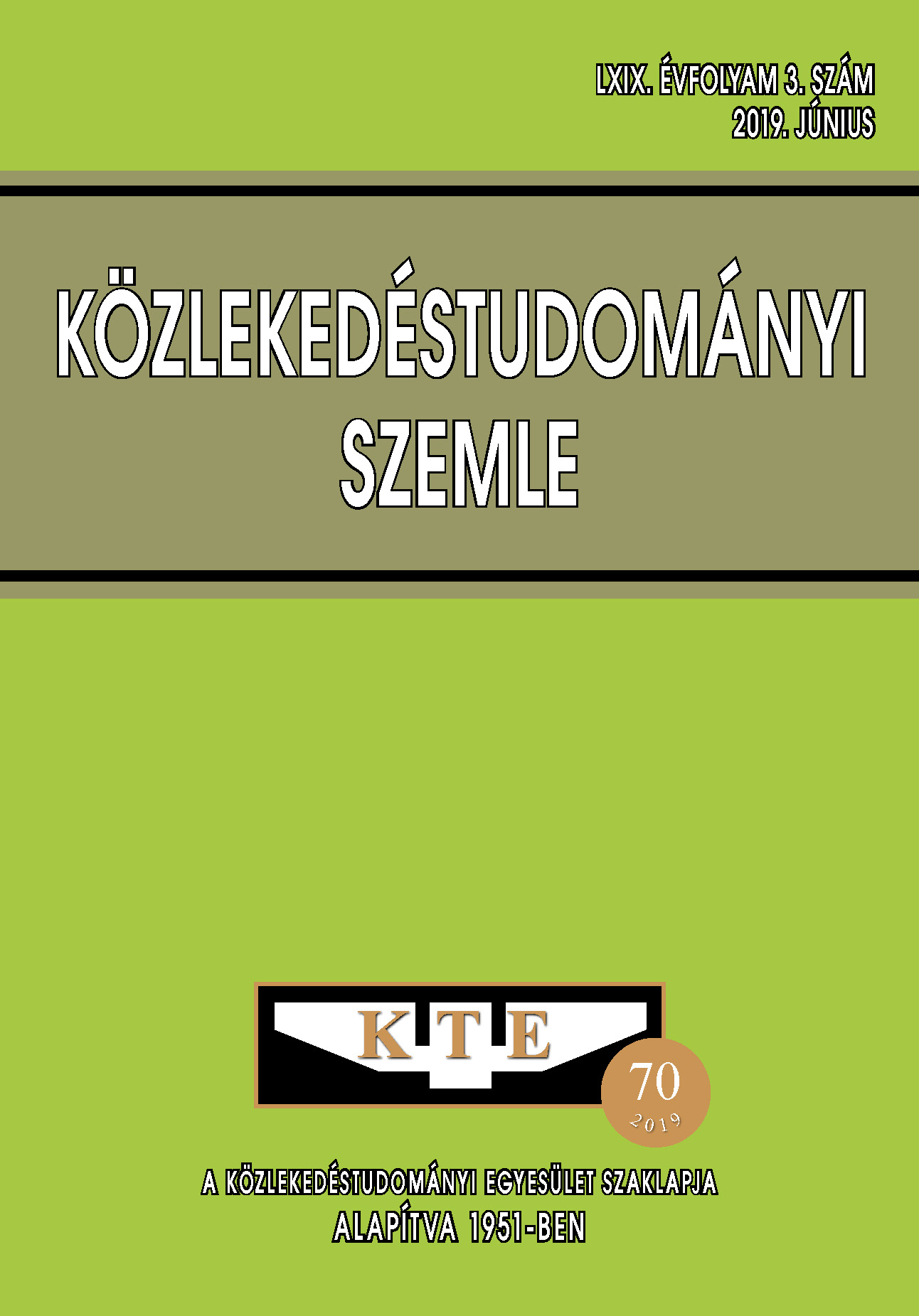Vasúti baleseti és katasztrófahelyzeti hulladékkezelésben alkalmazható biztonságtechnika és RFID-DRÓN módszerek
Absztrakt
A hulladékok gazdasági és társadalmi körfolyamatokba történő folyamatos visszavezetése érdekében fel kell tárni a műszaki biztonságtechnikát befolyásoló tényezőket, valamint meg kell határozni a hulladékgazdálkodásban alkalmazható műszaki biztonságtechnikai elemeket, azok vasútüzemi alkalmazhatóságát. Fontos a biztonságos vasúti veszélyes áruszállítás és havária események során környezetbe jutó veszélyes anyagok gyors és hatékony hulladékkezelésének segítése érdekében kidolgozott új módszer és a javasolt rádiófrekvenciásdrónos azonosítás.
Hiba, hogy a veszélyes árukra vonatkozó hatósági szabályozások sok tekintetben nem egységesek. Jelentős előrelépés lenne ezen áruk szállításának a közlekedési alágazatok közötti összehasonlítása.
Hivatkozások
Agoston Restas: Disaster Management Supported by Unmanned Aerial Systems (UAS) Focusing Especially on Natural Disasters Zeszyty Naukowe SGSP 2017, Nr 61 (tom 2)/1/2017
Agoston Restas: Drone Supported Interventions at Dangerous Goods Transportation’s Accident Saint Petersburg,
Russia 29 - 30 November, 2016
Attila Albini, Zoltan Rajnai: General Architecture of Cloud. Procedia Manufacturing 2018:(22) pp 485-490. Elsevier. Amsterdam. 2018. ISSN 2351-9789.
Hell Péter: Drónelhárító rendszerek az objektumvédelemben Hadmérnök 37-47 XII. Évfolyam 3. szám – 2017. szeptember
Kiss Leizer, Géza Károly: Possible Areas of Application of Drones in Waste Management during Rail Accidents and Disasters INTERDISCIPLINARY DESCRIPTION OF COMPLEX SYSTEMS 16 : 3 pp. 360-368. , 9 p. (2018) http://doi.org/c48z
Kiss, Leizer Géza Károly ; Tokody, Dániel: Radiofrequency Identification by using Drones in Railway Accidents and Disaster Situations INTERDISCIPLINARY DESCRIPTION OF COMPLEX SYSTEMS 15 : 2 pp. 114-132.,19 p. (2017) http://doi.org/c482
Kiss, Leizer Géza Károly ; Berek, Lajos: The Safety Technology Questions of Wastes Arising in the Course of Catastrophes in the Continental Traffic pp. 217-220. , 4 p. In: Bitay, Enikő (szerk.) A XXI. Fiatal Műszakiak Tudományos Ülésszaka előadásai. [Proceedings of the XXI-th International Scientific Conference of Young Engineers] Kolozsvár, Románia : Erdélyi Múzeum-Egyesület (EME), (2016) 452 p.
Kiss, Leizer Géza Károly; Maros, Dóra: Veszély-és katasztrófahelyzetekben keletkező hulladékok kezelése a vasúti közlekedésben, KÖZLEKEDÉSTUDOMÁNYI SZEMLE 65 : 3 pp. 58-66.,9p. (2015)
Kiss, Leizer Géza; Pokorádi, László: Hulladékkezelési kérdések a légi közlekedésben REPÜLÉSTUDOMÁNYI KÖZLEMÉNYEK (1997-TŐL) XXVII : 2 pp. 17-25. (2015)
Richárd Pető: Some Safety And Security Issues Of Uavs – I. Katonai Nemzetbiztonsági Szolgálat – National Security Review; ISSN 2063-2908 93-108.
Tokody Dániel, Tor Mária, Szűcs Endre, Francesco Flammini, Laszlo Barna Iantovics ON THE DEVELOPMENT
OF INTELLIGENT RAILWAY INFORMATION AND SAFETY SYSTEMS: AN OVERVIEW OF CURRENT RESEARCH INTERDISCIPLINARY DESCRIPTION OF COMPLEX SYSTEMS 16:1pp. 176-185., 10 p. (2018) http://doi.org/gdmz3n
Oculus Rift VR szemüveg: https://www.theverge.com/2018/10/23/18014562/oculusrift-video-on-demand-purchase-rentalservice-shutdown-november
Drón 360° kamerával: http://blogs.discovermagazine.com/drone360/2015/03/11/michigan-approvespolice-drone/#.XA6YCNtKiUk
°-os vasúti kamerafelvétel: https://www.youtube.com/watch?v=UXwD5VM_eW8
Az elektronikusan megjelenő cikkek nyílt hozzáféréssel rendelkeznek (OJS), online ingyenesen elérhetők és letölthetők. A cikkek szerzőit nem terheli megjelentetési vagy kiadási költség (APC). Felhasználóknak joguk van a cikkek olvasására, letöltésére, másolására, kinyomtatására, valamint azokban való keresésre, vagy a teljes szöveg linkkel történő megosztására.
A szerzőknek nyilatkozniuk kell arról, hogy beadványukat korábban nem tették közzé más folyóiratban, a pénzügyi támogatás feltüntetésre került és a hivatkozások listája teljes és pontos, beleértve az URL-ek és a DOI-k specifikációját is (ha rendelkezésre állnak). A cikktervezet beadásakor minden szerző jóváhagyja a benyújtott változatot. A szerzők garantálják, hogy a cikk az ő eredeti művük. A szerzők kötelesek részt venni a szakértői értékelés folyamatában, követni a bírálók tanácsait, betartani az előírt határidőket, és amennyiben előfordulnak, kötelesek visszavonni a benyújtást vagy kijavítani a hibákat.
Minden beadott cikket szakértői értékelés alá kerül, ahol a szerkesztők független értékelést kérnek legalább egy szakértőtől, ügyelve arra, hogy a bíráló(k)nak ne legyen összeférhetetlensége a szerzőkkel. A végső döntést a főszerkesztő hozza meg, aki figyelembe veszi az értékeléseket és a szerkesztők javaslatait. A szerkesztők és a lektorok bizalmasan kezelik a beadványt.
A kiadó és a szerkesztők elkötelezettek a magas etikai normák betartása mellett, és megakadályozzák azokat a publikációkat, amelyekben kutatási visszaélés történt. Az ilyen etikai kérdésekben a COPE irányelveit követik.
A szerzők fenntartják a szerzői jogokat, és megadják a folyóiratnak az első közzétételi jogot a Creative Commons Licenc alapján (https://creativecommons.org/licenses/by-nc-nd/4.0), amely lehetővé teszi mások számára, hogy megosszák a művet, elismerve a mű szerzőségét és a folyóiratban való első közzétételt.
A folyóirat archiválja az összes megjelent cikket, és a folyóirat tulajdonosa, a Közlekedéstudományi Egyesület továbbra is üzemelteti az adatbázist abban az esetben is, ha a folyóirat kiadása megszűnik.















